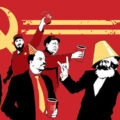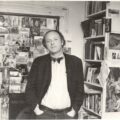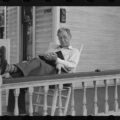Party On: An experimental review of Ksenia Buksha’s Freedom Factory

Author’s note: This piece is part seven in an ongoing series of experimental reviews about an unnamed literary critic who reviews works in translation.
The critic had missed her deadline and couldn’t bring herself to care.
On her couch, with her laptop on the coffee table, she looked at her notes about the book and read a quote: “The factory is a continuation of my father.” Ksenia Buksha had placed it near the end of her book, in one of the more experimental chapters. It had been meant, the critic thought, to convey a sense of something spiritual about the way the place a person works can enter their lifeblood.
The critic had stopped reading when she’d seen this sentence. When she started reading again she saw that she’d misread “factory” as “family.” Perhaps families are a sort of factory, she wrote in the margin. A tiny town of souls with fates and gossip.
As for her deadline, life would go on for her and her editor, and the book’s author and publisher, whether or not her review ever appeared.
At her mother’s sixty-fifth birthday party that weekend, she felt like she was near the center of her tiny town’s gossip. It started when her sister walked over to say she’d noticed their mother was drinking less than usual. “It’s that church guy,” her sister whispered. The critic nodded and looked at man, realizing she might have been glaring.
“That church guy” was a widower, a former high school Spanish teacher with three grown children. Their mother had known him before their father died. He’d urged their mother to start going to mass and she had
The critic thought of the washer in Buksha’s book. There was a wonderful scene—one of dozens superbly translated by Anne Fisher—where two Russian manufacturing engineers are about to test a submarine they helped build. But the electrical system isn’t responding. Nothing, no power. So one of them opens a control panel, crams in a washer wrapped in duct tape, and tries again. Just like that, it’s all systems go. One tiny washer, or the right comment well-delivered, and things come to life.
A few people at the party glanced in the critic’s direction, then toward her mother, who was talking to the church man. A new phase was beginning for their family, one that would, on some level, move her late father further back into the past. It would be a very different sort of relationship for her mother with this man. A new love late in life. No pressure to start a family, and they’d have lots of time for themselves, since they were both retired.
The church man seemed okay. He drank light beer, rather slowly. This was a relief with strange contours: the critic cared, in a specific way. He wasn’t Mr. Piety, but he wasn’t a lush—a fairly tall order for a lot of men in the Midwest. Her mother looked happy, and not the drunken barely-happy of the last few years.
The critic gulped at her wine as she watched her mother smile at this man. Family, she thought. Just when you thought certain things were settled, people swerved. Producing more gloom or joy or silence or love. Giving up pieces of their freedom to chase new dreams.
The Freedom Factory that Buksha wrote about was a real manufacturing facility in Leningrad. It opened in 1928 with “a brigade of young shockworkers…the precursor of our communist labor brigades.” A secret, military factory, it produced missiles, submarines, and other equipment for war. Buksha omitted hard dates, but the book seemed to cover from about 1960 to the mid-1990s, slightly beyond the dissolution of the U.S.S.R.
It was a surprisingly hilarious novel, a bubbling pot of big personalities, forty short chapters bursting with historical detail, wit, conflict, and a solid balance of Communist Party nostalgia with bitterness about Soviet hardships.
Buksha showed life up close for the workers. Their pride and struggles, specialized skills, and dreams of escape amid the collective success. Fisher brilliantly adjusts her translation to follow the many modes Buksha’s prose adopts. And it’s no simple task. Buksha’s a poet, equally adept at dialogue-heavy, realist, oral history as she is at creating lush, literary character portraits, in an array of settings from the factory floor to a ship bound for Cuba.
The characters have one-letter names or first names only (Valya, Tanechka, Verka, Pashka) as if Buksha is protecting their identities while also stamping them as stock characters in a socialist narrative about the glory and folly of labor conditions under Soviet rule. Glimpses of their faces seem to appear in some of the author’s abstract, black-and-white illustrations.
In the book’s more stylized passages—sometimes mixing dialogue with exposition, omitting quotation marks, dialogue tags, and line breaks—the critic had to parse the text quite carefully in order to follow along. Buksha, she understood, didn’t do this for mere effect. She made meaningful, often touching, points to end almost every chapter, to capture the tone and spirit of the people over several decades in this place.
The critic watched her sister introduce her four-year-old daughter to the church man. Standing nearby, her mother put her drink down, then picked it back up. The moment had caught her off guard, perhaps. Then she crouched down to help smooth this introduction to her granddaughter.
This is a moment our family has built, the critic thought. A tableau at a family event. If she wrote fiction she wasn’t sure how she’d describe it. Buksha had the knack. She could see beauty in the workers’ pride as they built data link targeting systems for Yak-28L tactical bombers. She could draw empathy for young men like F., who’d rather be sent to Antarctica than work a single day at the factory. The scales of pride and loyalty versus disgust and corruption. That rang true. Given the choice, who wouldn’t be reluctant to commit to a lifetime of unknown work with a bunch of strangers?
At family events, or the office or a factory, the conditions are sometimes awful. Holidays. Funerals. Assembly lines. Daily tests of loyalty. The critic remembered the chapter titled, “Inga and the Woman of Hell,” where, “The women in the hot-dip galvanizing shop sail along in mighty canvas smocks tarred with streaks, fumes and shadows and dotted with holes drilled by drops of acid.” Lovely language, to show the workers’ toughness, but with a dire tone, evoking the dangers involved.
Even for workers who looked for beauty in the grand project of collective labor, reality wilted before the ideal. Buksha said as much, cataloguing what their bodies took in each day, “the smells of a Leningrad factory on a cold, sunny day, the smells of a fresh sea wind, asphalt, and iron fillings, the smells of brick, bitumen, concrete, creosote, new grass, earth, machine oil, smoke.”
Survival required a sense of humor. It’s the same with family, the critic thought. Several of Buksha’s chapter titles nodded to this fact, like “The Factory Agitational-Propaganda Troupe,” and “Let’s Go Slurp Our Camp Swill.” There were also some star comedians posing as philosophers at Freedom. Among them was H., a stoic factory director who waits in one scene for everyone to stop arguing before he pipes up: “All done shouting? I’m going to tell you a joke. It’s a freezing-cold day. A little bird’s flying around. It freezes and falls down into the road. A horse goes past. It poops on the little bird. The little bird warms up and starts chirping. And a wolf comes along and eats the little bird. The moral: if you land in a pile of shit, don’t chirp. Go do your work.”
Even on their time off, Buksha places the workers in the shadow of the factory and Russian history. One technician is excited to be on a ship bound for Cuba with equipment for the communists there. But he’s not enjoying the view or thinking ahead to exploring the island. Instead he’s toying dangerously with an American plane buzzing the ship, sending the pilot confusing radio signals by turning on and off “the first Soviet radar system for the merchant fleet, developed right in our very own Freedom Factory.” In a scene at the beach, the comrades’ bodies deliver unexpected sights. “At the seashore in the south, everybody strips down to their underwear, and you can really see which of the men were in the war. From a distance you can see that lots of them still have all their arms and legs, but when you go down to the water and look at all their backs and bodies, you’re just amazed how some of them managed to stay alive after such wounds.”
Five years of chemo had changed the critic’s father, too, before he passed. People hold a factory—or a family, or a nation—together, but eventually they have to let go of old bonds.
Buksha shows the workers learning this fact with a certain gentleness, but without lowering her guard against nostalgia for Soviet life. While proud, when outsiders arrive, the Freedom workers must admit something is amiss about their world. “One time a delegation of communists from one of the rebellious Latin American republics turned up at Freedom, and they asked the Komsomol members: ‘The revolutionary movement was born in your country. So tell us, how? What methods did you use to organize your underground, to coordinate a real revolution?’ The Komsomol members grew sad.”
After the Soviet Union’s collapse, Freedom produced civilian goods like subway tokens and medical devices. “That means that instead of making rockets, we’re going to be making washing machines. What? You think those aren’t very scary?” jokes one worker. “Our washing machines are scarier than any bomb! Our bombs don’t explode, but our washing machines do. Regularly! The only thing that could possibly be worse than a hostile nuclear era is a peaceful atomic age.”
For other workers, hope and despair come in waves as production tapers off. One steadfast product, however, their pride and joy, is the Golden Globe, a portable radiation detector.
“Our Golden Globe was a lifesaver for patients in Warsaw Pact countries,” explains one engineer. “Although we supplied it to capitalist countries too. It’s just that in the USSR, Bulgaria, Mongolia, Cuba, it was the only thing they had. Some Globes are thirty, forty years old now, but they still work, they’re still saving people’s lives.”
When the workers stop being paid, the dream ends. “Every five minutes, one person quits his job at the Freedom Factory. That’s two thousand people gone a month.” Party loyalty is no longer required, which some workers take comfort in — “We didn’t let the country go back to communism.” But others are happy to mock the managers who were fake comrades all along. “(Director) V lied his whole life, he said he was a Communist but he hung around the church whenever he could! And now he’ll hang around the church, but still keep his Party membership card tucked in his pocket!”
By the end, even Tanechka, a labor union rep, who appears most frequently in the book, begins to lose faith. “Strange thoughts come into her head. What has she spent her life on? On this factory here. What factory? There is no factory anymore. Who is she? No family. No accomplishments. What can a labor union be now? Nothing.” It’s a quick, powerful moment, demonstrating the author’s ability to craft strong characters within a fractured narrative.
The factory’s history haunts those who remain, watching from below: “Through the window a light dusting of snow is visible, and the profile of a woman, composed of cracks in the asphalt across from the Central Tower, turns white, transparent, and icy.”
“But who’s going to mint the metro tokens?” bellows a manager who can’t let it go. “And who’s going to rivet together the advertising columns? And what about the crematorium fence?! … You’ll thread your own noses if you have to, but you’re not leaving! Because without you, there is no factory!!”
The critic had imagined her family falling apart, too, after her father died. For a few years they each grieved, slow to come back together. But there it was, their little family, a factory, still cranking out existential moments, her mother putting down a drink in hesitation, her sister whispering in her ear. They’d re-tooled, re-aligned. They kept going.
It seemed strange to her, how people gave their whole lives to the one life they had. Her own life felt much more layered at times. New phases,
As she and her sister watched their mom smile at the church man, the critic said, “I don’t know if I’m ready for all that again.”
“If she’s ready, we have to be,” her sister said.
The critic looked away.
“She’s been through some shit,” her sister said, and sighed, as if trying to break the news. “If she’s ready, knowing it could happen all over again with this guy?”
The critic raised her beer. She clinked bottles with her sister. Their mother came over as they were sipping their drinks.
“What are you two smirking about?”
About Matthew Jakubowski
Matthew Jakubowski is a literary critic and fiction writer based in West Philadelphia. His criticism has appeared in Bookforum, Kirkus Reviews, Full Stop, gorse, Interfictions, The Quarterly Conversation, and 3:AM Magazine.





